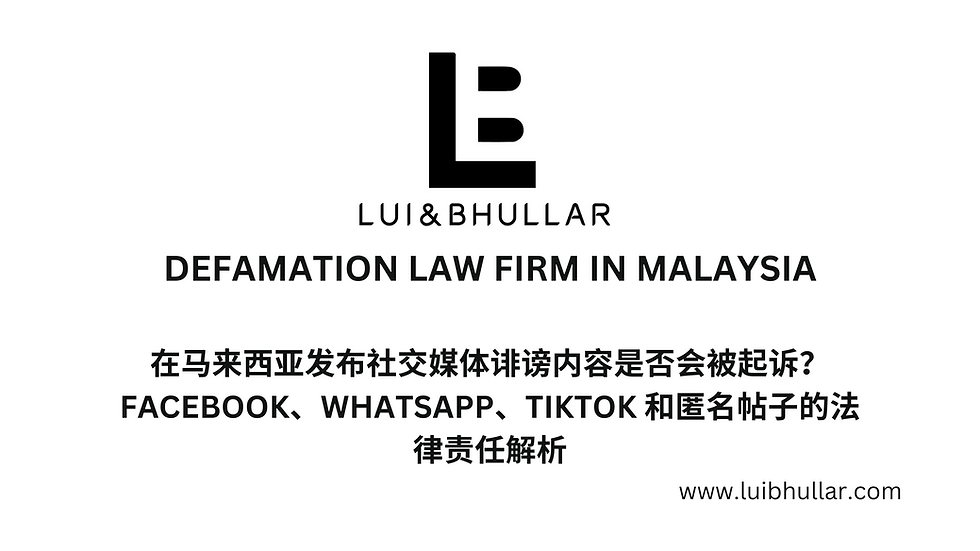Defamation Case: Cardiologist Wins RM100,000 in Libel Suit Against Department Head
- Messrs Lui & Bhullar
- Jul 3, 2025
- 3 min read
Updated: Oct 15, 2025
By Messrs Lui Bhullar

Medical Defamation Case: Cardiologist Wins RM100,000 in Libel Suit Against Department Head
Medical Defamation Case | Defamation Lawyer Malaysia | Qualified Privilege Malaysia
In a significant medical defamation case in Malaysia, the High Court recently ruled in favour of a consultant cardiologist at Sunway Medical Centre (SMC), awarding RM100,000 in general damages against the defendant – the Head of the Cardiology Department – for libellous statements made in an internal letter circulated within the hospital.
This case offers important insights into the law of defamation in Malaysia, especially within professional and institutional contexts such as hospitals. It also highlights the limitations of the defence of qualified privilege in Malaysia, particularly where malice and lack of legitimate interest are in issue.
Background: Defamatory Letter and Allegations
The dispute arose from a letter dated 14 November 2017, authored by the defendant and addressed to the hospital's Deputy Managing Director and CEO. The letter, which was copied to seven other senior personnel, contained multiple statements regarding the plaintiff's medical conduct, including:
Performing coronary procedures on patients without consulting the primary cardiologist.
Pressuring asymptomatic patients into undergoing angiograms urgently.
Performing angioplasties deemed inappropriate or not aligned with the American College of Cardiology (ACC) guidelines.
Potentially exposing the hospital and cardiologists to medico-legal liability.
These statements, referred to as the Impugned Words, formed the basis of the plaintiff’s defamation claim.
Plaintiff's Case: Reputational Harm and Malicious Publication
The plaintiff, a consultant cardiologist, alleged that the Impugned Words were false, defamatory, and had caused significant damage to his professional reputation within the hospital. He contended that:
The statements implied he was unethical, unprofessional, and did not comply with accepted medical standards.
The publication of the letter led to loss of trust, professional odium, and isolation among peers.
The defendant acted recklessly or with malice, possibly out of revenge (balas dendam), and did not verify the truth of the allegations.
The plaintiff sought general and aggravated damages, an injunction, and interest on the judgment amount.
Defendant’s Defence: Qualified Privilege in Malaysia
In response, the defendant admitted that the statements referred to the plaintiff and were circulated to third parties but claimed protection under qualified privilege.
He argued that:
The recipients had a legitimate interest in the content of the letter.
The statements were made in good faith, without express malice.
The letter was a response to queries from the hospital CEO concerning angioplasty cases.
Court’s Findings: Impugned Words Were Defamatory
The High Court undertook a two-stage test as established in Malaysian defamation law:
Were the words capable of bearing defamatory meaning?
Were they, in fact, defamatory?
The Court held that the Impugned Words:
Implied the plaintiff was incompetent, pressured patients, and failed to adhere to clinical guidelines.
Would cause an ordinary, reasonable reader to regard the plaintiff with contempt and suspicion.
It was therefore determined that the words were defamatory.
Rejection of Qualified Privilege Defence
On the issue of qualified privilege, the Court ruled that:
The defendant exceeded the scope of the CEO’s inquiry.
The recipients of the letter had no legitimate interest in the defamatory content.
As such, the defence of qualified privilege failed.
Since qualified privilege was not established, the Court found it unnecessary to make a ruling on express malice.
Damages and Injunction Awarded
In assessing defamation damages in Malaysia, the Court considered:
The limited circulation of the defamatory letter.
The fact that the plaintiff was not subject to any disciplinary action.
The seriousness of the allegations.
The Court ordered the defendant to:
Pay RM100,000 in general damages;
Bear legal costs of RM50,000;
Cease any further publication of the defamatory words (injunction granted);
Pay interest at 5% per annum until full settlement.
No aggravated damages were awarded.
Key Takeaways: Defamation Law and Qualified Privilege in Malaysia
This decision reaffirms several legal principles relevant to defamation lawyers in Malaysia:
Qualified privilege requires both a duty to communicate and a corresponding interest to receive the communication — this is judged objectively.
Even internal workplace communications can be actionable in libel, especially where malice or lack of legitimate interest is shown.
Medical professionals have the right to protect their reputation from unverified and damaging statements, even within an institutional context.
Need Legal Advice on Defamation in Malaysia?
If you are a professional facing a defamation claim, or believe you've been defamed by a colleague or employer, it is essential to consult with an experienced defamation lawyer in Malaysia.
We provide confidential consultations for:
Medical defamation
Workplace libel
Qualified privilege disputes
Professional reputation protection
Contact our defamation law firm today to protect your legal rights and professional standing.
If you're unsure how to sue for defamation in Malaysia or need to identify the person behind defamatory online content, consult our legal team today. At Messrs Lui & Bhullar, we combine strong legal strategy with digital expertise to hold online defamers accountable.
📧 Email: general@luibhullar.com
📞 WhatsApp: +60143000970




Comments